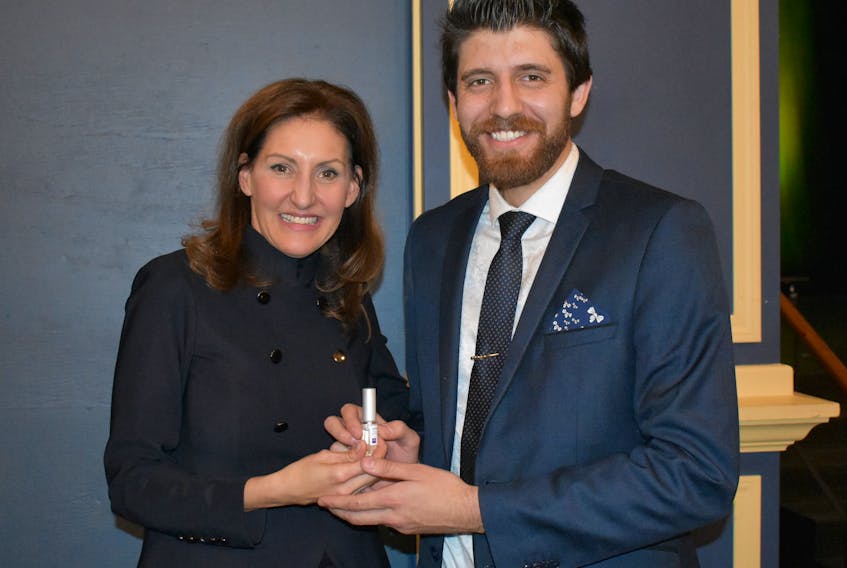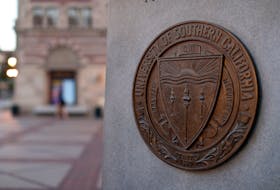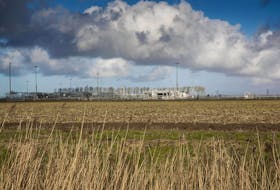The key phrase of night at Game Changers: The Social Bottom Line, at the deCoste Performing Arts Centre, was “social enterprise,” a term describing the mingling of economic and community interests in the creation of business.
Numerous guests braved the slippery conditions on Thursday evening to listen to three game changers in the business world, who in their illustrious careers have managed to create something of true value to enrich the communities in which they live, through their entrepreneurial work.
Mark Brand, Tareq Hadhad and Barbara Stegemann, three entrepreneurs who have successfully created social enterprises in their communities, spoke to guests about their experiences and what they have learned in the creation of those social enterprises.
A thread of commonality that ran through the themes of the three talks was the focus on bucking negativity, stereotypes and limiting thinking.
Hadhad, who is the general manager of Peace by Chocolate in Antigonish, described the importance of giving back to the community, relating it back to his experiences in helping to rebuild his family’s chocolate making business from the ground up, after it was destroyed in the civil war in which his homeland, Syria is embroiled.
Hadhad described the tremendous gratitude he felt toward the people of Nova Scotia and Antigonish, in how accepting they were to him, as he transitioned from life in Syria to Canada.
“Going down the stairs at the airport, the people from Antigonish came to the airport that night, with flowers and signs. They didn’t know me, they didn’t ask about my religion or ethnicity. The thing that was cared about was that I was a human being seeking safety and peace with my family. I knew I was coming to a special community,” said Hadhad.
Hadhad emphasized peace as the “noblest value on Earth” – something that inspired the name of the successful business he manages, that has put Nova Scotia on the map as far as cholcatiers are concerned. Hadhad said his business carries out social enterprising by hiring locals and asking people who’ve moved away from the province to return, so he can offer them work. Such a process is a rejection of the negative idea that Nova Scotia is a “have not” province, and economic dead-end.
“We know in this province, we need more people. And that is something that is very doable – by supporting each other,” said Hadhad, noting that seeking partnerships and supporting local businesses are ways to build strong communities with engaged citizens that can help one another.
Stegemann – one of the Top 100 Most Powerful Women in Canada, a winner of numerous entrepreneurial awards and the first Atlantic Canadian woman to land a deal on Dragon’s Den – shared her positive, feminist perspective on building a business. She emphasized the healthy, joyful mindset that is necessary in social enterprises – and in any personal endeavour. This mindset extended to her idea that social enterprises should be used to fight corruption in society.
Stegemann’s desire to be a game changer in the business world started when her friend was severely wounded in Afghanistan. Stegemann saw the importance of supporting an economy like Afghanistan’s, to help its people, fight the corruption of the opium industry by supporting farmers who grew other, healthier crops.
From her desire to help, Stegemann created The 7 Virtues of Beauty, which sources organic oils from countries experiencing turmoil, such as Afghanistan, to create perfumes.
Stegemann described how she didn’t let any trifling negative opinions slow her down or discourage her, referencing her response to nay-sayers who claimed “you won’t get your perfume into a store,” by using the “cheeky Socratic Method,” and responding with, “so when is the last time you made a perfume and tried to sell it?”
From the initial “cold calls” that eventually led to her getting a business deal with The Bay, the continual growth of her perfume company to the reinvention she carried out on her business model to make a deal with cutting edge beauty company Sephora, Stegemann emphasized a growth mindset, referencing the stoic philosophy of Roman emperor Marcus Aurelius as a guiding principle.
Brand, who also served as emcee for the night, is owner of 11 businesses and shared his story of creating social enterprises that helped struggling and marginalized communities.
Many of the anecdotes and experiences he shared related to his work helping struggling people dealing with mental illness, drug addictions homelessness and other barriers to prosperity in Downtown Eastside Vancouver, a place he described as “the largest open-air drug market in North America,” through his butcher shop and diner, Save on Meats.

Mark Brand, owner of Save on Meats in Downtown Eastside Vancouver. Brand was an emcee and speaker at the Thursday evening event.
Brand said one of his motivating factors was the need to feed people to keep them healthy, referencing staggering numbers indicating that huge proportions of the population do not get sufficient nutrition. His desire to help the marginalized people of Vancouver lead to him integrating his businesses with community groups to form network of partnerships to help elevate the struggling members of the community.
Brand said an important part of being able to help people is being willing to listen to them, as he did in a story about Mike, a man who fell on hard times who eventually started working for Brand after a conversation between the two on a day Brand discovered him sleeping in the street – Mike is remains valued and integral employee.
In a gentrifying downtown Vancouver neighbourhood, “where it was quickly becoming a place where if you wanted to eat, it was a $20 halibut meal…or a bag of chips,” Brand took it upon himself to find opportunities to feed people, and help wherever he could, knowing what it was like to be part of the marginalized population on the streets from past personal experience.
His motivation to help led Brand to building connections with local food producers, such as farmers in BC near the city, sourcing the best possible quality ingredient and meat that could be prepared – for both those who could pay and those who were unable to. An example of Brand's social enterprise in action is the Token Program – a system whereby people can buy tokens that can be redeemed for a sandwich. Since its launch in 2013, at total of 100,000 of those tokens have been redeemed, and many homeless people have gotten a much needed meal as a result.
In addition to feeding the marginalized, Brand worked to create programs to allow people with barriers in life to find a job that fits for them, giving them a sense of purpose and belonging, which translates into motivated workers.









